After observing several overturned coffee cups with increasing curiosity during my first few months here, it became apparent that one does not simply sip Turkish coffee for its taste, nor for its stimulating qualities. Rather, its grounds are used as a looking glass into the future. This practice of divining the future (called “fal” in Turkish), and the broader field of astrology in Turkey, can be traced back to at least the Seljuk Empire, dating back to the times of Tuğrul and Çağrı Bey in 1028.
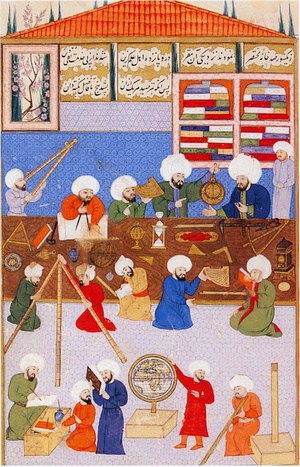
Beginning in the 15th century, the müneccimbaşı, or chief astrologer/astronomer, held a significant position in the Ottoman Palace. These astrologers were tasked with answering questions of future political and strategic importance. Their other practices ranged from tasseography (reading coffee grounds), calendar preparation, documentation of celestial events, and the general management of the other astrologers. One of the Ottoman Empire’s most famous chief astrologers, Taqi al-Din (Takiyüddin, 1526–1585), even built an observatory in Istanbul whose size rivaled that of the great observatory in Samarkand. Within months of completing the observatory, a comet with an enormous tail appeared in the sky, which Taqi al-Din interpreted as “an indication of well-being and splendor” and would mean a “conquest of Persia” for Sultan Murad III.
Today, governments around the world have little use for these oracles, but the tradition of fortune telling still remains a pervasive part of Turkish culture. Istiklal Caddesi in Taksim is home to a staggering number of these cafes. You need only to read the words “FAL” to understand that what they are offering is an experience dedicated to the art, practice, and preservation of Turkish fortune telling.
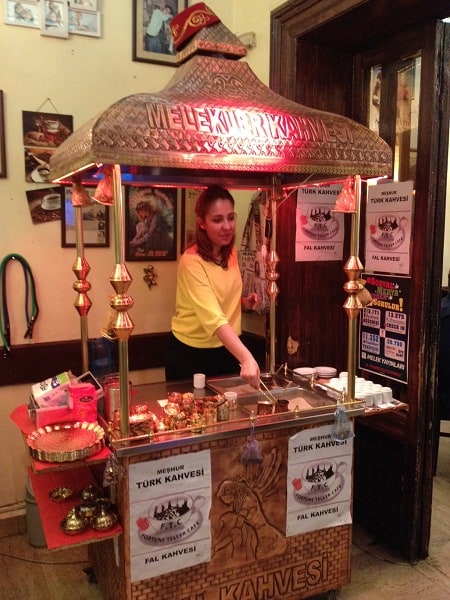
Where can I have my fortune read?
Perhaps one of the most well-known cafes in Taksim, Melekler Kahvesi, was founded in 2001 and is Istanbul’s original fortune telling café. Its exterior may appear similar to any other café, but its inside plays host to a variety of pleasures. Coffee beans imported from Brazil are roasted in-house for every cup of Turkish coffee. The café is also home to a number of fortune tellers, of which there are at least one or two English and German speakers. Board games are available to patrons while they wait for their fortunes to be read, or while they sip coffee and chat with friends.
How is a fortune read?
The fortune teller may choose to use a mixture of methods to predict your future. The resident fortune teller, or “müneccimbaşı”, of Melekler Kahvesi, Ahmet, explains that the reading of coffee grounds, however, is the most popular method throughout Turkey. Every cup of Turkish coffee used in fortune telling should be prepared in a cezve (a small copper pot), and only one cup is brewed per cezve. Also, each cup should have at least a little sugar, even if it’s ordered black. This helps in the even distribution of the coffee grounds and makes for a better reading.
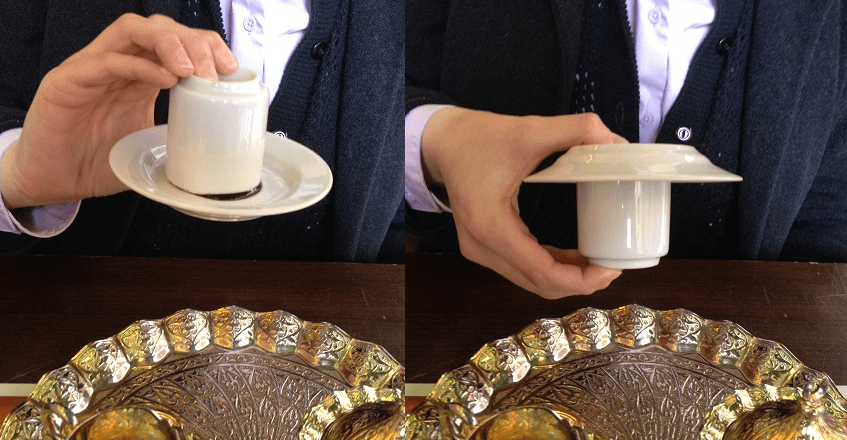
The procedure for the participant is generally performed by finishing off any remaining drinkable coffee in your cup, placing the saucer on the top of the cup, swirling the cup around in a circular motion to help the grounds distribute evenly, and then flip over the cup and saucer; this motion should be done towards you rather than away from you. Once the bottom of the cup has cooled, it’s time for the fortune teller to interpret its secrets. Many people choose to place a coin or other metal items on top of the cup as it’s cooling to take away any negative energy. Others, however, swear it’s only used to make your cup cool faster.
According to Ahmet, the cup is read and interpreted much like a clock. With the handle facing towards you, the left side represents the future, the right represents the present. The bottom of the cup explains your present psychological situation. The handle’s area represents family and social relations. The fortune teller “reads” your fortune by deciphering the images that appear within the coffee grounds. These images represent symbols and various omens, both good and bad.
Aren’t fortune tellers just trying to make money?
The truth is, the fortune-telling industry is just like any other one, and a very unpleasant one at that, Ahmet explains. Reading fal is a fun cultural activity that can be done just between friends, but if you go into it commercially the first goal is always making money. If making money is the main objective, it can never be genuine. At Melekler Kahvesi, there are many other reasons to come for a visit and having your fortune read, if you so choose, is but one of them.
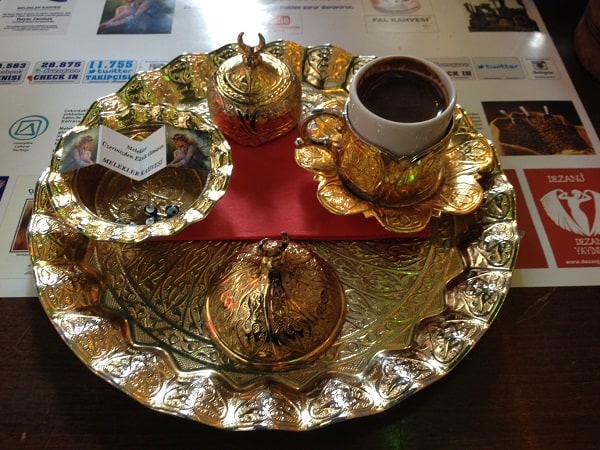
Why do people choose to have their fortune’s read?
People are always curious about what’s next. We worry — it’s in our nature. Because of these factors, people have developed fortune telling. Ahmet finds that fortune telling is kind of like therapy. In the West, we have psychologists; in the East, fortune tellers. Some of these fortune tellers are quite experienced and, as a result, have become good at what they do. With experience comes increased observation skills, allowing a fortune teller to help you navigate the future, which is in some ways similar to the goal of a therapy session.
After having my fortune read and experiencing this facet of Turkish culture, I still find myself an unbeliever, especially regarding the more mystical aspects of fortune telling in practice. I do feel, however, that there is truth to why this tradition developed. As a species, we are undoubtedly curious and social beings. We crave an outlet for our frustrations, our worries, and find comfort in advice obtained from the experiences of others. If we think of fortune telling in this context, it certainly is a lot cheaper than visiting a therapist.
Sarah Juptner is a contributor to Yabangee.
Featured Image Source: S. Juptner









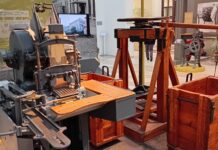

[…] 26. Get in on some of that sweet, sweet fortune telling action. […]